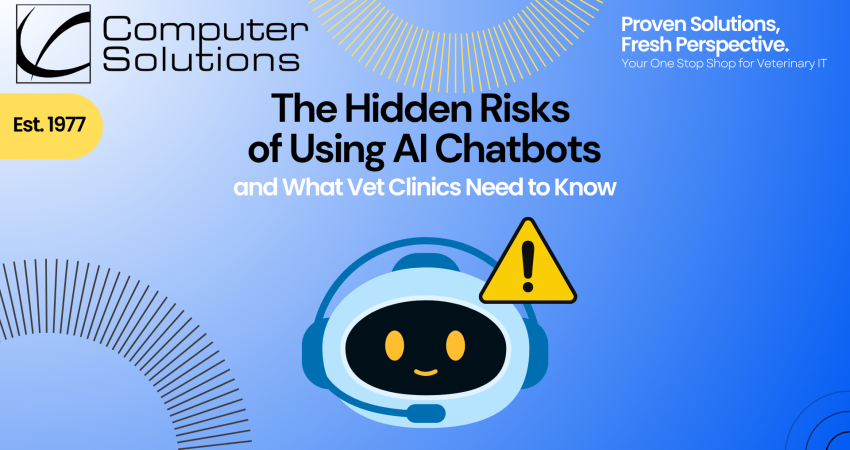
Posted by Computer Solutions on April 28, 2025
AI chatbots like ChatGPT, Gemini, Microsoft Copilot, and the recently launched DeepSeek have made their way into nearly every corner of our professional and personal lives. They help draft emails, generate social media posts, brainstorm ideas, and even manage grocery lists. It’s no wonder they are quickly becoming trusted digital companions.
However, as these AI-powered tools grow more embedded in our daily routines, a critical question emerges: How secure is the information we share with them?
For veterinary practices that handle sensitive client information, patient records, and confidential business data, understanding the risks of AI chatbots is no longer optional — it’s essential.
What Happens to Your Data When You Use a Chatbot?
Every time you engage with a chatbot, you’re giving it information — sometimes personal, sometimes proprietary. Let’s explore how that data is often handled:
1. Data Collection: Chatbots capture the text you input to generate responses. This can include internal business strategies, financial information, staff communications, or even details about your patients and clients.
2. Data Storage: Depending on the platform, your interactions may be temporarily logged or stored for much longer. Here’s a closer look at a few popular AI tools:
- ChatGPT (OpenAI): Collects your prompts, device info, location data, and usage patterns. It may also share this data with “vendors and service providers.”
- Microsoft Copilot: In addition to prompts and device info, it gathers browsing history and app interactions. This information can be used to personalize ads and train AI models.
- Google Gemini: Retains chat logs to “improve services” and “develop machine learning technologies.” Data may be kept for up to three years — even after deletion requests.
- DeepSeek: Perhaps the most concerning, DeepSeek not only collects your conversations and device details but also your typing patterns. This data is stored on servers in the People’s Republic of China and is used for ad targeting.
3. Data Usage: While some companies claim the primary goal is to “improve user experience,” the reality is that much of your shared information trains AI models and feeds into marketing and sales ecosystems. Furthermore, human reviewers may also evaluate your conversations.
Why Veterinary Practices Should Be Concerned
The veterinary industry is built on trust, compassion, and confidentiality. Clients trust you with their pets’ health and personal information. Therefore, a breach of that trust, even unintentionally through AI usage, could damage your practice’s reputation and expose you to legal risks.
Key risks include:
- Privacy Breaches: Sensitive information entered into a chatbot could be accessed by developers, third parties, or even cybercriminals. Veterinary practices are custodians of confidential data — including client names, addresses, payment information, and detailed pet health records.
- Security Vulnerabilities: Some AI tools can be exploited by malicious actors. Research has demonstrated vulnerabilities in platforms like Microsoft Copilot, where hackers could manipulate the system to perform phishing attacks or steal data.
- Regulatory Compliance Issues: In states where client confidentiality is legally protected, or under regulations like GDPR if you have clients traveling internationally, improper data handling can result in steep fines or lawsuits.
How You Can Protect Your Practice
Fortunately, you don’t have to abandon AI altogether to stay secure. Here are smart steps veterinary practices can take:
- Be Mindful of What You Share: Always avoid inputting confidential client, patient, or business information into AI chatbots — even if the tool feels trustworthy.
- Understand Platform Policies: Make it a priority to review each chatbot’s privacy policy and data retention practices. Some platforms allow you to opt out of having your chats used for training purposes.
- Leverage Privacy Controls: Tools like Microsoft Purview can help organizations monitor and govern the use of AI, ensuring compliance with privacy standards.
- Stay Informed: AI companies update their terms of service and privacy policies frequently. By regularly checking for changes, you can adjust your practices accordingly.
- Work With Trusted IT Experts: Partnering with an IT provider who understands both cybersecurity and the unique needs of veterinary practices can help you implement safe, efficient tech solutions without sacrificing security.
Bottom Line: Stay Smart, Stay Safe
Chatbots are incredible tools that can boost your efficiency, creativity, and productivity. Nevertheless, they also come with hidden risks, especially when handling sensitive data.
Veterinary practices that prioritize cybersecurity today will build stronger client trust and resilience tomorrow. By being cautious and informed, you can enjoy the benefits of AI while protecting your practice from unnecessary exposure.
Want to make sure your practice is fully protected?
Visit welinku.com today to schedule your FREE discovery call. We’ll assess your current IT setup, identify vulnerabilities, and help you create a plan to secure your data — so you can focus on what you do best: caring for pets and the families who love them without worrying about the risks you may be taking using chatbots.
If you’d like to stay in the loop with our articles on security, IT tips, and best practices for veterinary clinics, be sure to subscribe to our newsletter on LinkedIn here!
Discover more from Computer Solutions
Subscribe to get the latest posts sent to your email.







